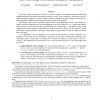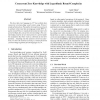111 search results - page 3 / 23 » Errors in Computational Complexity Proofs for Protocols |
95
Voted
STOC
2007
ACM
16 years 1 months ago
2007
ACM
A zero-knowledge proof allows a prover to convince a verifier of an assertion without revealing any further information beyond the fact that the assertion is true. Secure multipar...
121
Voted
JCIT
2010
14 years 8 months ago
2010
In 2008, Wang et. al. first investigate a sort of specific secure multi-party computation--secure convex hull two-party computation, and construct two protocols based on Gift wrap...
106
click to vote
FOCS
2009
IEEE
15 years 7 months ago
2009
IEEE
— The question of whether or not parallel repetition reduces the soundness error is a fundamental question in the theory of protocols. While parallel repetition reduces (at an ex...
126
Voted
COCO
2004
Springer
15 years 6 months ago
2004
Springer
We study the power of quantum proofs, or more precisely, the power of Quantum MerlinArthur (QMA) protocols, in two well studied models of quantum computation: the black box model ...
118
click to vote
FOCS
2002
IEEE
15 years 6 months ago
2002
IEEE
We show that every language in NP has a (black-box) concurrent zero-knowledge proof system using ˜O(log n) rounds of interaction. The number of rounds in our protocol is optimal,...


